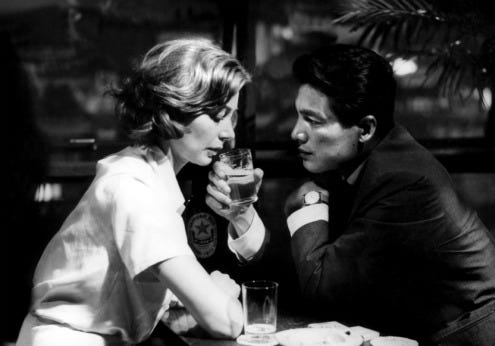Hiroshima mon amour (1959)

"Hiroshima mon amour" helped kick off the French New Wave in 1959. It's interesting that filmmaker Alain Resnais has often been identified as part of that movement; he'd already been making movies for more than a decade before that while Truffaut, Godard and the gang were off pretending to be film critics.
(I say "pretend" because they've more or less acknowledged that they were just trying to get attention to launch their own filmmaking careers.)
It's the story (perhaps "story" is not the right word, Resnais often being less concerned with coherent narrative than evocative imagery and ideas) of two people — a Frenchwoman named Elle (though we never hear her name), played by Emmanuelle Riva, and a Japanese architect named Liu (Eiji Okada). As the film opens, they have just had a one-night stand ... or so she thinks. He feels a powerful pull toward her, which she at first disavows but eventually comes to acknowledge.
Alas, she's an actress shooting an anti-war movie in Hiroshima, and the next day she is scheduled to fly back to Paris. They spend the next 36 hours or so in a running conversion about love, death, the bombing of that city and forgetfulness.
I can't say I really enjoyed myself watching "Hiroshima mon amour." As with Resnais' more recent work, I find his style deliberately off-putting — the thought of entertaining an audience seems repugnant to him — but I respect the film for its audacious storytelling. Marguerite Duras earned an Oscar nomination for her screenplay.
One of the things Resnais does that is truly groundbreaking is the many mini-flashbacks he inserts into a scene so you can visualize what a character is talking or thinking about. Like when Elle discusses her period of madness while a young girl living in Nevers, the view slips from the streets of Hiroshima where she's walking to the stony maze of that French town. It sounds so simple and has since come to become a staple of the language of cinema. But in 1959, it was truly revolutionary.
The sexuality depicted, while not overt, is still notable. The opening shot is of a man and woman's naked limbs intertwined, and there are numerous shots of Riva and Okada canoodling in bed, cavorting in the shower, etc. While the camera is carefully framed to avoid showing anything that would've gotten the film banned, it's quite brazen by Hollywood standards of the time.
Roughly speaking, the first half of the film is about the horror of the Hiroshima bombing, and the second half is about Elle's estrangement from her hometown community after falling in love with a German soldier during World War II. In both cases, the other person expresses sympathy and understanding of the tragedy, while the one relating the tale rebutts and rebukes them, saying they couldn't possibly relate.
"You are not endowed with memory," Liu tells her when Elle expresses grief over the bombing.
The first sequence is gripping in its depictions of the damage done to Hiroshima, the city and the people. Employing newsreel footage, Resnais lays bare the terrible burns, deformities and destruction wrought upon Hiroshima in a way that must have been new and shocking to American audiences at the time. Interestingly, the film never mentions that it was the United States that dropped the bomb or that similar destruction befell Nagasaki. I wonder if this film contributed to the fact that whenever the use of atomic/nuclear weapons is brought up, it is invariably Hiroshima that is evoked and not Nagasaki.
For me, the key moment of the film is when Liu asks Elle what she thought when she first heard of the bombing of Hiroshima. He was off fighting in the war, while his entire family perished. He's astonished to realize that most of the world celebrated the destruction of Hiroshima, since it marked the end of the war.
In her far less compelling section, Elle talks about the loss of her German lover and how the entire town ostracized her. Her hair was shorn off and her own parents locked her in the basement, where she went mad. Her primary regret is not the pain or the abandonment by her family, but the slow, gradual yet inexorable loss of the memory of her first love. In her narration, Elle tells Liu she knows she is destined to repeat this loss with him.
Impressive but not engaging, "Hiroshima mon amour" is a memorable film about forgetting.
4 Yaps



